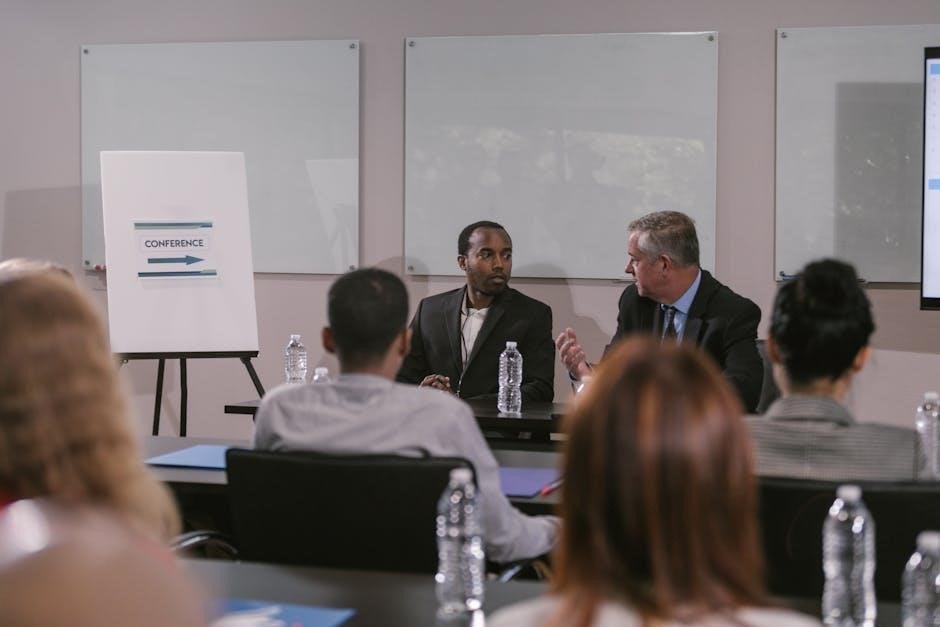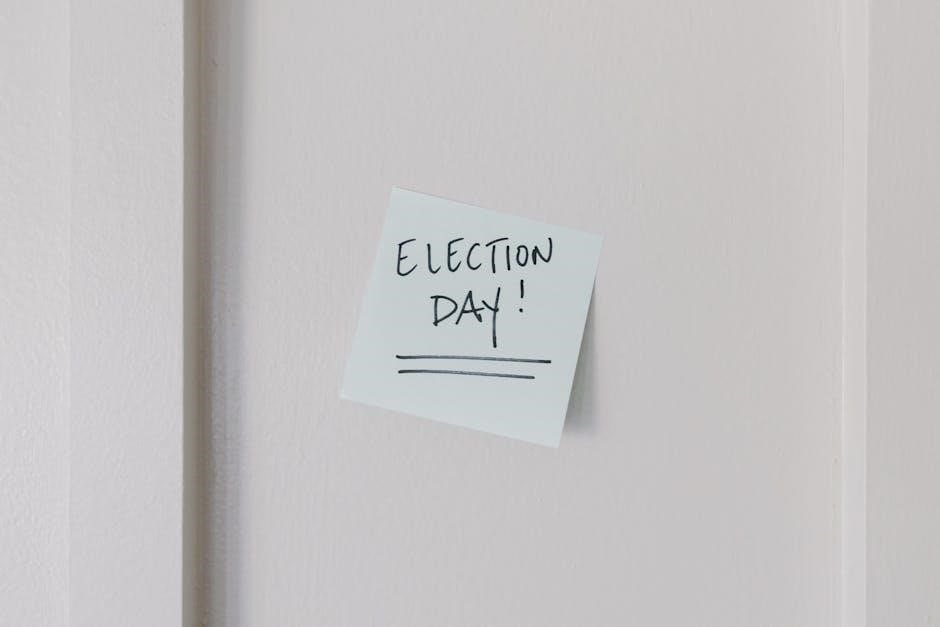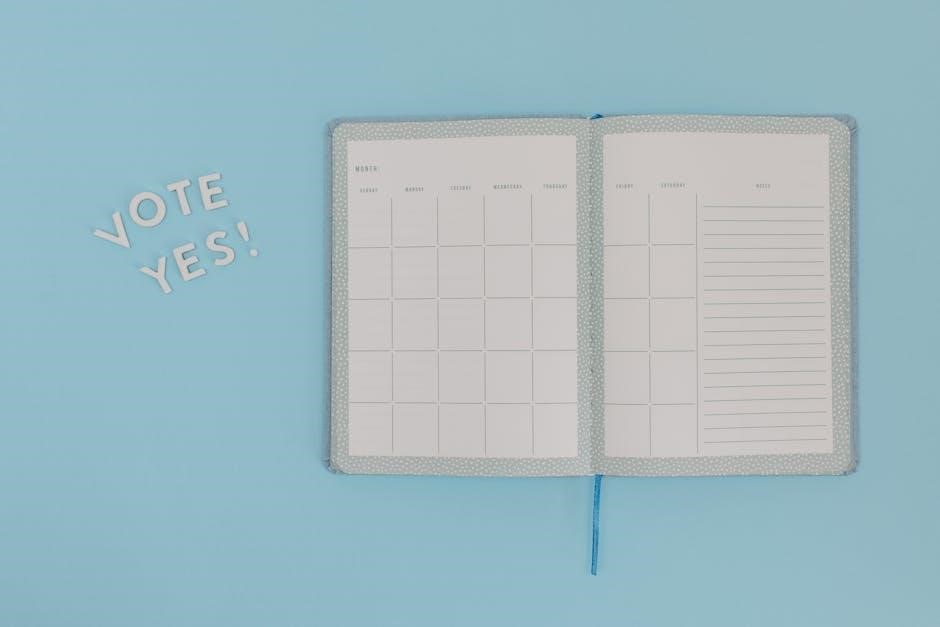An event planning questionnaire is a valuable tool for gathering detailed information from clients to streamline the planning process․ Using a PDF template, planners can efficiently collect data on event preferences, budgets, and logistics․ This structured approach ensures all essential details are captured, facilitating seamless execution and client satisfaction․ The questionnaire serves as a cornerstone for understanding client needs, making it indispensable for successful event management․
What is an Event Planning Questionnaire?
An event planning questionnaire is a structured document used to gather essential information from clients or stakeholders to effectively plan and execute events․ It typically includes questions about event type, date, budget, venue requirements, and preferences․ Available as a downloadable PDF template, it provides a professional and organized way to collect data․ The questionnaire ensures that all critical details are captured, from contact information to logistical needs, allowing planners to tailor the event to the client’s vision․ By using a PDF format, the document is easily shareable and fillable, making it a practical tool for efficient event planning․
Why Use an Event Planning Questionnaire?
Using an event planning questionnaire is essential for ensuring a smooth and successful event․ It helps gather crucial details about the client’s vision, preferences, and requirements in an organized manner․ By addressing key aspects like budget, venue, and logistics upfront, planners can avoid misunderstandings and ensure everyone is aligned․ The questionnaire also streamlines communication, saving time and reducing errors․ It allows for better organization of resources and timelines, leading to a more personalized and effective event execution․ Ultimately, it enhances client satisfaction by delivering an event that meets their expectations and stays within budget․

Types of Pre-Event Planning Questionnaires
Pre-event planning questionnaires vary based on event type, including corporate events, weddings, and general gatherings․ Each type is tailored to specific needs, ensuring detailed and relevant information collection․
- Corporate Event Questionnaires: Focus on agendas, attendee demographics, and branding preferences․
- Wedding Planning Questionnaires: Cover venue, theme, catering, and guest logistics․
- General Event Questionnaires: Address basic details like date, budget, and vendor requirements․
Corporate Event Questionnaires
Corporate event questionnaires are designed to gather detailed information for planning successful business events․ They typically include sections on event objectives, target audience, preferred dates, and budgets․ Questions may cover logistical needs such as venue preferences, catering options, and audiovisual requirements․ Additionally, these questionnaires often address branding elements like color schemes and company logos․ They may also inquire about attendee demographics to tailor content and networking opportunities․ By using a PDF template, corporate planners can ensure consistency and efficiency in data collection, helping to align the event with the company’s strategic goals and expectations․ This structured approach ensures seamless execution and a professional outcome․
Wedding Planning Questionnaires
Wedding planning questionnaires are essential tools for capturing couples’ preferences and requirements․ They typically cover key aspects such as ceremony type, theme, guest count, and budget․ Questions often focus on venue choices, catering options, and entertainment preferences․ Additionally, they may include sections for wedding colors, flower arrangements, and photography needs․ Some questionnaires also explore special requests, such as custom rituals or dietary restrictions․ By using a PDF template, planners can organize the information effectively, ensuring no detail is overlooked․ This structured approach helps create a personalized and memorable experience, aligning the wedding with the couple’s vision and expectations․
General Event Planning Questionnaires
General event planning questionnaires are versatile tools designed for a wide range of events, from conferences to birthday parties․ They typically include questions about the event purpose, target audience, and preferred date․ These questionnaires also inquire about venue preferences, catering needs, and entertainment options․ Additional sections often cover budget constraints, marketing strategies, and logistical requirements․ By using a PDF template, planners can easily customize the questions to fit specific event types․ This approach ensures comprehensive data collection, helping organizers deliver events that meet client expectations․ The flexibility of these questionnaires makes them ideal for various occasions, providing a structured yet adaptable framework for effective event planning․
Key Elements to Include in an Event Planning Questionnaire
Key elements include contact information, event details, budget, preferences, logistics, and marketing needs․ These components ensure comprehensive planning and execution, meeting client expectations effectively․
Contact Information and Event Details
Gathering accurate contact information and event details is crucial for effective planning․ Include fields for the client’s name, email, phone number, and organization․ Ask about the event type (e;g․, corporate, wedding, conference) and its purpose․ Request the event date, venue, and expected attendance․ Details like start and end times, setup requirements, and key stakeholders ensure clarity․ This section lays the foundation for understanding the event’s scope and objectives, enabling planners to align resources and strategies accordingly․
Event Budget and Financial Constraints
Understanding the event budget and financial constraints is essential for effective planning․ Include questions about the total budget, allocations for venue, catering, entertainment, and marketing․ Ask if there are specific areas where the client wants to prioritize spending․ Inquire about payment terms, sponsorships, or fundraising goals․ This section ensures that planners stay within financial limits while delivering a successful event․ Clarifying budget expectations early helps avoid overspending and aligns the planner’s strategy with the client’s resources․ It also allows for creative solutions to maximize the impact within the given budget, ensuring transparency and trust throughout the planning process․
Event Preferences and Theme
Understanding the event preferences and theme is crucial for creating a cohesive and meaningful experience․ Ask clients about their vision, preferred color schemes, and decor styles․ Inquire about the overall atmosphere they aim to create, whether formal, casual, or themed․ Include questions about event type, such as corporate, wedding, or social gatherings, and any cultural or personal elements they wish to incorporate․ This section helps planners align the event’s aesthetic and tone with the client’s expectations, ensuring the final result reflects their unique style and goals․ It’s also an opportunity to explore creative ideas that bring their vision to life effectively․
Logistics and Venue Requirements
Understanding logistics and venue requirements is essential for ensuring a smooth event execution․ Questions should address venue location, capacity, and layout preferences․ Ask about parking availability, accessibility features, and loading/unloading areas․ Inquire if specific amenities like restrooms, electrical outlets, or storage spaces are needed․ Determine if the venue must be indoors, outdoors, or a hybrid setup․ Include questions about timing, such as setup and teardown schedules, and any restrictions on noise levels or vendor access․ This section ensures the chosen venue aligns with the event’s operational needs, avoiding last-minute issues and ensuring everything runs seamlessly․ Clear logistics planning is vital for a successful event․
Marketing and Promotion Needs
Understanding the client’s marketing and promotion needs is crucial for aligning the event with their branding and outreach goals․ Ask about their target audience, preferred promotion channels (e․g․, social media, email, or print)․ Inquire if they have specific branding guidelines or materials to use․ Determine if they need help with creating promotional content, such as flyers, websites, or invitations․ Include questions about their budget for marketing and whether they require assistance with ticket sales or RSVP management․ This section ensures the event’s promotional strategy aligns with the client’s vision, maximizing visibility and engagement․ Effective marketing planning is key to attracting the right attendees․

How to Create an Effective Event Planning Questionnaire
Download a PDF template, customize questions to fit specific needs, and finalize the document before sharing it with clients or stakeholders․ Ensure clarity and relevance in every query․
Download a PDF Template

Downloading a PDF template for an event planning questionnaire is a practical starting point․ These templates are readily available online and offer a professional structure․ They include sections for contact details, event preferences, and budget constraints, ensuring no essential information is overlooked․ Customizable fields allow planners to tailor the questionnaire to specific needs, whether for corporate events, weddings, or general gatherings․ Using a PDF format ensures compatibility across devices and easy sharing via email․ Many templates are free or affordable, making them accessible to event planners of all levels․ This step simplifies the process, saving time and ensuring a comprehensive approach to event planning․
Customize the Questions
Customizing the questions in an event planning questionnaire ensures it meets the specific needs of each client or event type․ For corporate events, focus on agenda details, catering preferences, and branding requirements․ Wedding questionnaires might include themes, guest counts, and vendor preferences․ General event forms can address venue logistics, budget constraints, and marketing needs․ Tailoring questions helps gather relevant data, avoiding unnecessary inquiries․ This customization enhances clarity and efficiency, ensuring planners address all critical aspects․ It also demonstrates professionalism, showing clients their unique needs are prioritized․ By refining the questionnaire, planners can streamline communication and deliver personalized event experiences that exceed expectations․
Finalize and Share the Questionnaire
Once the event planning questionnaire is customized, review it for clarity and relevance․ Ensure all questions are concise and cover essential details․ Save the finalized version as a PDF to maintain a professional format․ Share the questionnaire with clients via email, attaching the PDF and providing a brief explanation of its purpose․ This step ensures clients understand the importance of their input․ By finalizing and sharing the questionnaire, planners can collect accurate data, streamline communication, and set a solid foundation for a successful event․ This process also demonstrates organization and attention to detail, fostering trust with clients․

Benefits of Using an Event Planning Questionnaire
Using an event planning questionnaire enhances organization, ensures clarity, and streamlines communication․ It collects essential data, reduces misunderstandings, and boosts client satisfaction, leading to a seamless event execution․
Data Collection and Organization
An event planning questionnaire serves as a centralized tool for collecting and organizing essential data․ It gathers critical information such as contact details, event preferences, budgets, and logistics in one place․ This structured approach ensures clarity and reduces the risk of miscommunication․ By organizing data effectively, planners can easily reference key details, track progress, and make informed decisions․ The questionnaire also helps identify potential gaps or overlooked elements, ensuring a comprehensive plan․ With all information consolidated, the planning process becomes more efficient, streamlined, and less prone to errors, ultimately contributing to a successful event execution․
Improved Client Satisfaction
An event planning questionnaire significantly enhances client satisfaction by ensuring their needs and preferences are accurately captured․ It provides a clear understanding of their vision, expectations, and priorities, allowing planners to tailor the event accordingly․ By addressing specific details such as themes, budgets, and logistics upfront, misunderstandings are minimized․ This structured approach fosters open communication and trust, making clients feel heard and valued․ The questionnaire also helps planners deliver personalized experiences, aligning the event with the client’s goals and preferences․ Ultimately, this leads to higher client satisfaction and a stronger likelihood of positive feedback and repeat business․
